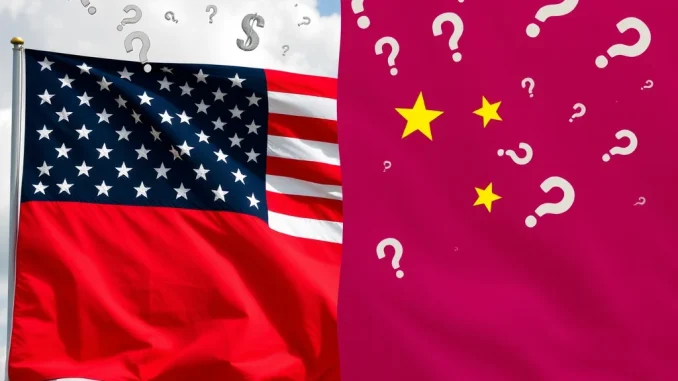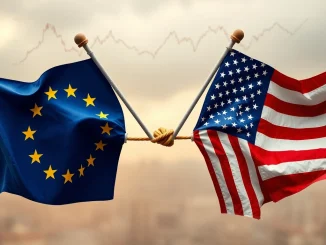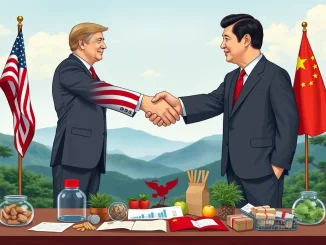
Are you following the escalating trade tensions between the world’s two largest economies? The latest volley? China’s fiery dismissal of new US tariff figures as a ‘global joke.’ Let’s dive into this developing story and understand what it means for the global economic landscape.
Decoding the ‘Global Joke’: China’s Tariffs Stance
Recently, the White House released a fact sheet highlighting that China now faces tariffs as high as 245% on certain imports to the United States. This sounds alarming, right? But hold on, according to Niutanqin, a WeChat account linked to China’s state-run Xinhua News Agency, this figure is nothing more than a “word game.” They’re calling the US tariff figure a ‘global joke’, dismissing it as a misleading combination of old and new tariffs rather than a substantial policy shift.
Here’s the crux of China’s argument:
- No Real Change: China argues that the 245% figure isn’t a brand new, sky-high tariff. Instead, it’s a sum of existing tariffs that were already in place, plus the newly announced ones. They suggest this is more about presentation than a radical change in US trade policy.
- ‘Word Game’: By labeling it a ‘global joke’ and a ‘word game,’ China is attempting to downplay the significance of the US announcement and discredit its impact on global perception.
- Economic Meaninglessness: China reiterates its long-held position that further US tariff hikes are economically ineffective and will be ignored. They believe these tariffs are more symbolic than impactful on their economy.
Essentially, China is saying, “We’ve seen this movie before, and it didn’t work.”
US Trade Policy Under Scrutiny: Is it Really a ‘Global Joke’?
While China’s rhetoric might seem dismissive, it raises valid questions about the effectiveness and global perception of current US trade policy. Is the US approach truly impactful, or is it, as China suggests, a ‘global joke’ in terms of achieving its intended economic outcomes?
Let’s consider some angles:
- Impact on US Consumers: Tariffs are essentially taxes paid by domestic importers, often passed down to consumers in the form of higher prices. Do these tariffs truly benefit the American economy, or do they primarily burden US citizens with increased costs for goods?
- Retaliation and Trade War Escalation: Tariffs are often met with retaliatory measures from the targeted country. This tit-for-tat escalation can lead to a full-blown trade war, harming businesses and economies on both sides. Are we seeing the seeds of a deeper trade war being sown here?
- Global Economic Instability: Trade disputes between major economies like the US and China create uncertainty and instability in the global market. This can impact supply chains, investment decisions, and overall economic growth worldwide. How is this trade friction affecting the global economic outlook?

The Economic Impact of Tariffs: More Than Just a ‘Joke’?
Regardless of whether you view it as a ‘global joke’ or a serious economic strategy, the reality of tariffs and trade disputes is far from humorous. They have real-world consequences. Let’s break down the potential economic impact:
| Impact Area | Potential Consequences |
|---|---|
| Businesses | Increased costs for imported goods, supply chain disruptions, reduced profitability, potential relocation of production. |
| Consumers | Higher prices for goods and services, reduced purchasing power, potential inflation. |
| Global Trade | Reduced trade volumes, increased protectionism, uncertainty in international markets, slower economic growth. |
| Investment | Decreased foreign direct investment, reluctance to invest in uncertain markets, shift towards safer assets. |
While China may dismiss the US tariff figure as a ‘global joke’, the underlying trade tensions are anything but. They represent a significant challenge to the global economic order and could have far-reaching consequences.
Navigating the Trade War Uncertainty: What’s Next?
The rhetoric is heating up, and the future of US-China trade relations remains uncertain. So, what can we expect, and how can businesses and individuals navigate this complex landscape?
>
Potential Scenarios:
- Escalation: Further tariff hikes from both sides, leading to a deeper trade war with significant economic fallout.
- Negotiation: Renewed dialogue and negotiations between the US and China to de-escalate tensions and find common ground on trade practices.
- Stalemate: A continuation of the current situation, with ongoing trade friction and uncertainty, but without significant further escalation.
Actionable Insights:
- Stay Informed: Keep a close watch on developments in US-China trade relations and their potential impact on your industry or investments.
- Diversify Supply Chains: Businesses should consider diversifying their supply chains to reduce reliance on any single country and mitigate risks associated with trade disruptions.
- Scenario Planning: Prepare for different scenarios – escalation, negotiation, or stalemate – and develop contingency plans to adapt to changing trade conditions.
- Seek Expert Advice: Consult with trade experts, economists, and financial advisors to understand the potential implications and navigate the complexities of the trade landscape.
The Last Word: Beyond the ‘Global Joke’ – Real Economic Stakes
China’s characterization of the US tariff figure as a ‘global joke’ is a bold statement, highlighting the deep chasm in perspectives on trade policy between the two nations. However, beneath the rhetoric and political maneuvering, lie real economic stakes. The ongoing trade tensions are not a laughing matter for businesses, consumers, or the global economy as a whole.
Whether you see it as a strategic move or a misguided policy, the US trade policy and China’s response are shaping the future of global commerce. As this story unfolds, staying informed and prepared is crucial for navigating the uncertainties of this evolving trade landscape. The ‘joke,’ if there is one, might be on the global economy if these tensions are not addressed with thoughtful diplomacy and a focus on mutually beneficial solutions.



